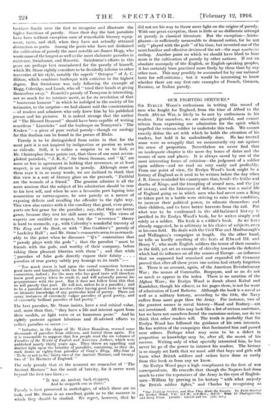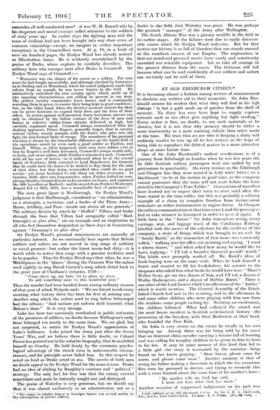OUR FIGHTING SERVICES.*
SIR EVELYN Woon's enthusiasm in writing this record of men who fought for England, from the time of Alfred to the South African War, is likely to be met by enthusiasm in his readers. For ourselves, we are sincerely grateful, and cannot refrain from expressing our admiration for the spirit which impelled the veteran soldier to undertake this task. We eannot exactly define the art with which he holds the attention of his readers, but hold it lie undoubtedly does. He has treated some wars so scrappily that we momentarily cry out against his sense of proportion. Nevertheless we, never fmd that an inadequate chapter is the mere dry bones of dates and the names of men and places. It is always saved by one of the most interesting forms of criticism—the judgment of a soldier upon soldiers—and we read on very easily and profitably. From one point of view, Sir Evelyn Wood's book might be a history of England as it used to be written before the day when J. R. Green reminded his countrymen that, beside the b:rtlis and deaths of Kings, and the trampling of armed men, and the joy of victory, and the bitterness of defeat, there was a social life of England going on in which men who had never seen a King or taken part in a battle were striving to raise their condition, to increase their political power, to educate themselves and their children, and to force better harvests from the soil. But what was to be condemned in the old-fashioned history ii justified in Sir Evelyn Wood's book, for he writes simply and solely as a soldier. His book is a soldier's book. As we havi already suggested, he is arbitrary in his choice of subjects, even in his own field. He deals with the Civil War and Marlborough's and Wellington's campaigns at length. On the other hand, he tells us hardly anything of the feats of Edward M. and Henry V., who made English soldiers the terror of their enemies in the field, yet set an example of chivalry towards the defeated which had its influence on all the armies of Europe—an influence that we supposed had remained and expanded till Germany proved that after all these years one nation had utterly forgotten it. There is no account, again, of the American Revolutionary War ; the names of Cornwallis, Burgoyne, and so on do not so much as appear in the index There is no mention of the Afghan Wars ; Sir Evelyn Wood is dumb about Kabul and Kandahar, though his silence, as hiS pages show, is not for want of admiration of Lord Roberts. Although the boOk is a naval as well as a military history, according to the- title, the Navy suffers from more gaps than the Army. FOr instance, two of the greatest names in naval history—Hood and Rodney—aro not mentioned. All this may look like a list of serious omissions, but we have not ourselves found the omissions serious, nor do we think that other readers will. The truth is probably that Sir Evelyn Wood has followed the guidance of his own interests. He has written of the campaigns that fascinated him and passed over others. Perhaps what may seem to be a defect in proportion or knowledge may be, after all, the secret of his success. Writing only of what specially interested him, he has never let go of the power to interest his readers. The history is so simply set forth that we must add that boys and girls will learn what British soldiers and sailors have done as easily from this book as from any we know.
Sir Evelyn Wood pays a high compliment to the first of war correspondents. He remarks that though the Napiers had done much to raise the reputation of the Army in-the eyes of English- men—William by proving in his history " with what majesty the- British soldier fights," and Charles by recognizing a;s • Oar Fighting Serrices, and how They Made the Empire. Ily Field-Marshal -Sir Evelyn' Wood, V:C:., PlietogrgrareA
and many I'lane. Loaddn : Cassel! and Co. Ins. nets • - comrades all well-conducted men*—it was W. H. Russell who by his eloquence and moral courage called attention to the soldiers of sixty years ago In earlier days the fighting man and the mass of civilians had not been brought into any close sense of common citizenship—except, we imagine (a rather important exception), in the Cromwellian wars. At p. 18, in a book of over six hundred pages, Sir Evelyn Wood has already arrived at, Elizabethan times. He is evidently overwhelmed by the
genius of Drake, whose exploits he carefully describe>. The military hero who emerges next after Drake is Cromwell. Sir- Evelyn Wood says of Cromwell :- " Worcester was the climax of his career as a soldier. For nine years he had fought successfully, and although checked by fortresses, as at Stirling and at Waterford, where his sound judgment made him refrain from an assault, he was never beaten in the field. He instinctively embodied the true cavalry spirit, which, made up of two opposing characteristics, can seldom be present in one man. The perfect cavalry commander loves horses, and is continually watching them in peace, to ensure their being kept in good condition ; but, on the other hand, when the decisive moment arrives for their use be never hesitates to expend their lives and the lives of their riders. In action against well-mounted, brave horsemen, success can only be obtained by the fullest venture of the lives of men and horses in cohesive ridden-home attacks delivered at high, but carefully regulated speed. Cromwell always remembered what his dashing opponent, Prince Rupert., generally forgot, that in cavalry actions victory mostly remains with the leader who puts into the fight the last-formed body of troops. The soundness of his personal teaching is shown by the remarkable difference on the battle-field of the squadrons raised by even such a good soldier as Fairfax, and himself. When, as often happened, their men were ridden over at first by Rupert's well-born horsemen, Cromwell's troops would rally, re-form, and await orders, while Fairfax's remained a mob. Cromwell, with all his care of horses—as is indicated when he at the second battle of Newbury, 1644, retorted to Lord Manchester, his General, that he could have the horses if he wished to flay them for the sake of their skins, but that being overworked they could do no good service—yet never hesitated to ride them out when necessary. In October, 1649, after two long marches, when Fairfax halted on com- pleting 50 miles, Cromwell went on for another six hours, and captured the 900 Levellers at Burford ; and his march from Perth to Worcester, August 3rd to 29th, 1651, was a remarkable feat of endurance."
The next great figure is Marlborough. Sir Evelyn Wood's judgment is that Marlborough, considered as " an administrator, as a strategist, a tactician, and a leader of the Three Arms- -Horse, Artillery, and Foot—stands out above all our generals."
The military devices by which he " bluffed " Villars, and broke through the lines that Villars had arrogantly called " Marl- 'borough's ne plus ultra," are an example and an inspiration to all who feel themselves despondent in these days at hammering against " Germany's ne plus ultra."
Sir Evelyn Wood's personal reminiscences are naturally of particular interest.. As we continually hear regrets that British soldiers and sailors are not moved to sing songs of military or naval prowess—but rather the latest music-hall ditty—it is worth while to notice that songs with a genuine tradition used to be popular. Thus Sir Evelyn Wood says that when he was a 'Midshipman in the Queen' during the Crimean War the sailors used nightly to sing David Garrick's song which dated back to the great year of Chatham's victories, 1759 :—
" Come cheer up, my lads, 'tis to glory we steer, To add something more to this wonderful year."
Thus the wonder had been handed down among ordinary seamen of that year of which Walpole said: " We are forced to ask every morning what victory there has been for fear of missing one." Another song which the sailors used to sing before Sebastopol :liad the refrain: "And nations yet unborn shall transmit what lielson's done." It is very strange.
Lake has been too commonly overlooked in public estimates of the greatness of soldiers, no doubt because Wellington's early fame belonged too nearly to the same time. We are glad, but not surprised, to notice Sir Evelyn Wood's appreciation of .Lake's brilliance. Lake joined the Army just after the Seven .Years' War, and we believe there is little doubt, as Colonel Penne has pointed out in his valuable biography, that he modelled himself on Granby. He held firmly by the enormous psycho- logical advantage of the attack even in unfavourable circum- stances, and his principle never failed him. In this respect he acted on land as Drake acted at sea. The merits of both men
no doubt appeal to Sir Evelyn Wood for the same reason. Drake bad no idea of abiding by Burghley's cautious and " political "
strategy. The only fact for him was that the enemy existed
somewhere and must be instantly sought out and destroyed. The praise of Wolseley is very generous, but we should say
that it was almost exclusively as an administrator, not as a.
Tteatat,aa to Charles .37.aper In Trafalgar Square was erected mainly by 'flie-subseriptions of &Wee- sofdlers:
leader in the field, that Wolseley was great, He was perhaps the -greatest " manager "- of the Army after Wellington.
The South African War was a gloomy muddle in the field in its earlier stages. All the failures were due to easily discover- able causes which Sir Evelyn Wood indicates. But for that matter our history is so full of blunders that one stands amazed at the resultant success of our Empire. The explanation is that our moral and personal merits have vastly and notoriously exceeded our scientific equipment. Let us take all courage in the present distress from the omen. The Germans will fail because what can be said confidently of our soldiers and sailors can certainly not be said of them.



































 Previous page
Previous page